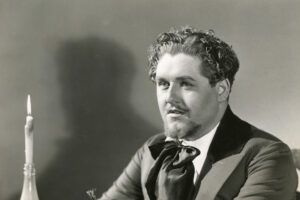

Although she once made a French baroque CD including bits of Charpentier’s Médée, a big star like von Otter performing in a staging of a Lully work isn’t necessarily what one might expect. But since the turn of this century, her adventurous operatic choices have sometimes been quite surprising from Carmen to Brangäne and Waltraute to Leokadja Begbick.
Before the 1980s Lully’s operas were considered historically important but otherwise ignored as grandiose pageants but ineffective music-drama. Although there were earlier efforts to disprove that view, it held sway until the remarkable 1985 revival of Atys by Les Arts Florissants. Over the intervening years I’ve heard most of his operas and they are admittedly quite variable with the strongest (imo) being Armide (the only other Lully done by LAF whose fine DVD is sadly out of print) and Roland in addition to today’s Thésée.
An early work from 1675, it conforms to the usual structure of tragédie lyrique and begins with a ceremonial prologue followed by five short acts each leavened by divertissements which occasionally comment on the plot. This leisurely presentation of the drama means that neither Médée nor Thésée arrive on the scene until the second act, more than an hour in.
Lully’s opera deals with Médée well after all that trouble with Jason. But the libretto fudges on mythology where she simply resents Thésée’s claims to the throne and instead puts her into a love triangle with him and Aeglé. She, of course, if being wooed by King Egée who turns out to be Thésée’s father. Médée, being Médée, doesn’t like being thwarted when daddy embraces his sonny-boy’s return and blesses his union with Aeglé; not unexpectedly she wreaks havoc when she learns of this turn of events.
However, since there must be a lieto fine, a goddess in the neighborhood drops by to restore order celebrated by dances and choruses of rejoicing. But Charpentier’s great opera Médée (about that nasty Jason business) less than twenty years later daringly dispensed with the happy ending altogether.
Those allergic to countertenors, fear not: French baroque composers never used castrati so no need to cast a modern-day falsettist.
After listening again recently to both Handel’s Teseo (which is based on the Philippe Quinault libretto set by Lully and which was posted here in October) and Lully’s Thésée and noting their vivid depictions of Medea, I got to thinking of some other favorite opera (anti-)heroines drawn from either mythology or antiquity, so throughout the year “Trove Thursday” will feature a number of these: Alcestis, Semiramis, Dido, Cleopatra, and others including perhaps yet another Medea.
Lully: Thésée
Théâtre des Champs-Elysées
22 February 2008
Broadcast
Anne Sofie von Otter — Médée
Sophie Karthaüser — Aeglé
Jaël Azzaretti – Cérès/Cléone/Une Bergère
Aurélia Legay — Vénus/Dorine
Salomé Haller — La Prêtresse
Paul Agnew — Thésée
Jean-Philippe Lafont — Egée
Nathan Berg – Mars/Arcas
Cyril Auvity – Bacchus/Un Plaisir/Un Berger
Le concert d’Astrée
Emmanuelle Haïm — conductor
Thésée can be downloaded by clicking on the icon of a square with an arrow pointing downward on its audio player and the resulting mp3 file will appear in your download directory.
All “Trove Thursday” podcasts since the series began in September 2015 remain available from iTunes for free, or via any RSS reader.


























Comments